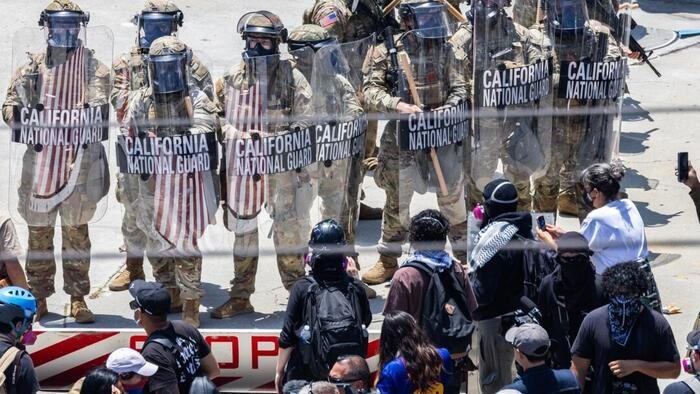A federal court commenced the hearing of testimonies on August 11 in a trial aiming to determine the legality of President Donald Trump’s deployment of National Guard troops for law enforcement purposes in California.
This trial forms part of a larger legal discussion concerning the extent of the federal government’s authority in addressing lawlessness within the nation.
On the trial’s onset, Trump announced his intention to activate National Guard troops to combat criminal activities in Washington.
Sam Dorman reports for The Epoch Times that U.S. District Judge Charles Breyer, who presides over the trial, had previously prohibited Trump’s utilization of National Guard troops, a decision later overturned by an appeals court.
Breyer’s ruling focused on whether Trump contravened a federal law stipulating that the president must issue directives through a state governor.
This trial specifically examines whether Trump violated the Posse Comitatus Act by deploying federal troops for civilian law enforcement purposes.
The trial is expected to span three days and feature multiple witnesses. On August 11, the state of California presented three witnesses, including Maj. Gen. Scott Sherman, who oversaw the troops in the state.
The testimonies of Sherman and Enforcement and Removal Operations Field Office Director Ernesto Santacruz Jr. delved into the intersection between federal law enforcement and the activities of military troops deployed in California.
California Governor Gavin Newsom, who initiated the lawsuit against the administration in June, alleges that the Trump administration breached the Posse Comitatus Act by involving troops directly in civilian law enforcement tasks, such as establishing blockades and detaining civilians.
Last week, the Justice Department argued for the trial’s cancellation, contending that the federalized National Guard troops were focused on safeguarding federal property and personnel rather than enforcing laws.
Furthermore, the Justice Department cited a different section of federal law permitting the National Guard to enforce laws.
Referring to Section 12406, the law allows the president to federalize the National Guard under specific circumstances, such as when unable to implement federal laws with regular forces.
This was the legislation that Breyer previously deemed violated by the president.
According to Sherman’s testimony, troops were responding to multiple assistance requests as of the night of August 10.
The Department of Defense announced on June 11 the deployment of over 4,000 troops, including Marines and National Guard members.
By August 5, the Justice Department informed Breyer that only about 300 Guardsmen, less than 10% of the initial force, remained.
During Sherman’s testimony, California’s attorney played a segment of Defense Secretary Pete Hegseth’s address outlining plans to mobilize the National Guard in Washington that morning.
In the capital, Trump is mobilizing hundreds of National Guard troops and invoked a law placing the Metropolitan Police Department in Washington under his authority for 48 hours.
House Judiciary Ranking Member Jamie Raskin (D-Md.) accused Trump of instigating a “fabricated crisis” and announced plans to introduce a resolution granting full home rule powers to the Mayor, Council, and residents of the District of Columbia.
Loading recommendations…

